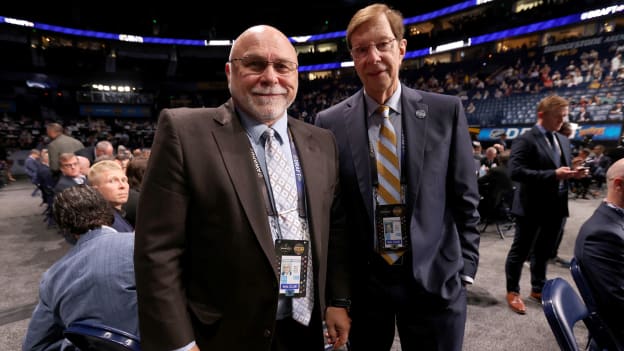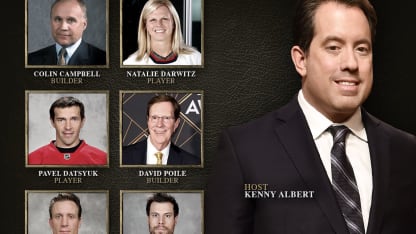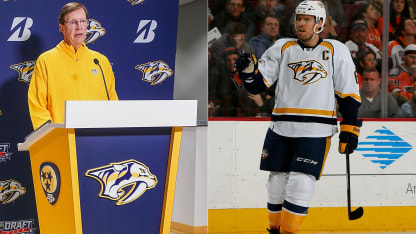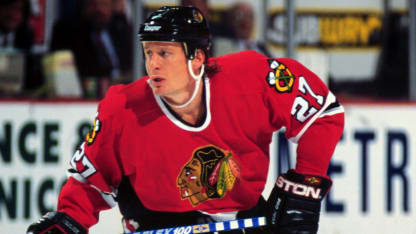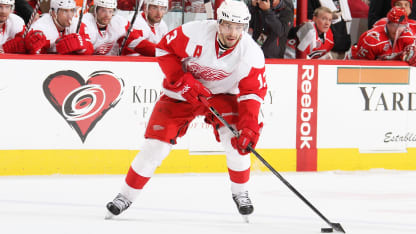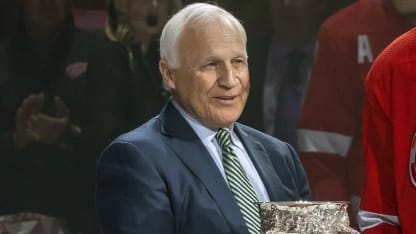The 2024 Hockey Hall of Fame induction is Nov. 11. This year’s class includes David Poile and Colin Campbell in the Builder category, as well as former players Pavel Datsyuk, Jeremy Roenick, Shea Weber, Natalie Darwitz and Krissy Wendell-Pohl. Here, NHL.com staff writer Tom Gulitti profiles Poile.
Poile excelled in 'his dream job,' will enter Hall of Fame as winningest NHL GM
Turned Capitals into playoff contender, then built Predators from scratch during 39-year run
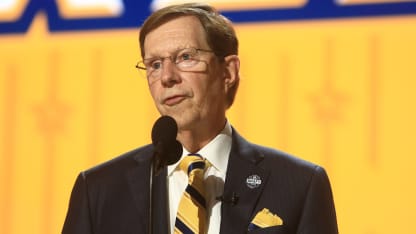
© Getty Images
David Poile has always considered himself a planner and a builder.
That approach served him well during his 51 years working in the NHL, beginning as an administrative assistant with the expansion Atlanta Flames in 1972 through his first general manager job with the fledgling Washington Capitals in 1982, being hired as GM of the expansion Nashville Predators in 1997 and until his retirement in 2023.
So to Poile it's the ultimate honor for him to be in inducted into the Hockey Hall of Fame in the Builders category in Toronto on Nov. 11.
"It's the pinnacle of what anybody could ever expect in this business," Poile said. "As I've heard said before me, when you get into hockey it's for the love of the game. I had always hoped I could be a player, and I never was quite good enough to be an NHL player. But I got the second-best job and that was something I wanted my whole life, is to be a general manager.
"My wife tells me one of the reasons why she married me is that I always had a plan, and I told her at a very young age that someday I would be an NHL general manager. So I think I worked hard to get there."
Poile was 32 years old and the youngest GM in the NHL when he was hired Aug. 30, 1982, to turn around the Capitals, who did not qualify for the Stanley Cup Playoffs in their first eight seasons after entering the NHL in 1974 as an expansion team. He retired as GM of Predators on June 30, 2023, as the NHL leader with 3,075 games and 1,533 wins as a GM.
The 74-year-old is the only GM with 1,000 games and 500 wins with two franchises -- 1,180 games and 594 wins during his 15 seasons with Washington and 1,895 games and 939 wins in 24 seasons with Nashville. His teams qualified for the playoffs in 29 of his 39 seasons as GM and he won the Jim Gregory General Manager of the Year Award in 2017 when the Predators reached the Stanley Cup Final before losing to the Pittsburgh Penguins.
Poile received the Lester Patrick Award for outstanding service to hockey in the United States in 2001 and was inducted into the U.S. Hockey Hall of Fame in 2018.
"David has always loved the game, and he loved being a part of the game, so when he says being an NHL general manager was his dream job, I truly believe that," said Barry Trotz, who was the Predators' first coach and succeeded Poile as their GM. "He loved the daily challenges and the building process of being a GM."
Take a look back at Hockey Hall of Fame Inductee David Poile's NHL GM career
Poile, who was born in Toronto and played three seasons at Northeastern as a center, followed in the footsteps of his father, Bud Poile, a 1990 inductee into the Hockey Hall of Fame as a Builder. Bud Poile, who died in 2005 at age 80, was the first GM of the expansion Philadelphia Flyers in 1967 and the expansion Vancouver Canucks in 1970.
"Hockey is in the Poile family," Poile said. "It was 24/7, 365 days a year. Everything was that: hockey camps, hockey vacations, going on trips with my dad, being at the draft with my dad, having players come over to our house, which was not unusual in that day and age, for dinner. It was just there all the time. It would have been difficult for me to avoid it."
One of Dick Patrick's first tasks after joining Washington as president in the summer of 1982 was hiring a new GM. The Capitals were struggling on the ice and in establishing a fan base, and with owner Abe Pollin considering selling, Patrick thought they needed someone to give the franchise a fresh start.
"He was certainly that, and young and had the college background as well," Patrick said of Poile. "He just seemed to check the boxes as I got to know him through the interview process and beyond that."
Even before Poile was hired, he wrote down a plan that included acquiring a top defenseman. By fate, when Poile attended his first NHL Board of Governors meeting 10 days after he got the Capitals job, he was seated next to Montreal Canadiens GM Irving Grundman.
Canadiens defenseman Rod Langway was on Poile's list of potential trade targets.
"They were having contractual issues, and they had some fantastic defensemen as it was," Poile said. "So I believe that he was available, and when I got into the Board of Governors meeting just by luck -- I didn't know where to go, I was scared out of my mind nervous -- I sat down, and Irving Grundman sat beside me. The deal was made by the end of the day."
The Capitals acquired Langway, fellow defenseman Brian Engblom, and forwards Doug Jarvis and Craig Laughlin for defenseman Rick Green and forward Ryan Walter. Patrick acknowledged it was, “a very bold move,” considering Green and Walter were two of the Capitals' top players and Walter was Pollin's favorite player.
"And it worked out very well for us," said Patrick, now Capitals chairman and a minority owner. "It worked out for Montreal too. They won a Cup (in 1986). It also accomplished what I was hoping would happen with the new administration, something bold, something different changing the look of the team."
The Capitals qualified for the playoffs for first time in 1982-83, beginning a run of 14 consecutive postseason appearances. Langway, a 2002 inductee into the Hockey Hall of Fame, won the Norris Trophy as the best defenseman in the NHL in 1982-83 and 1983-84 and played in the NHL All-Star Game five times in his 11 seasons with Washington (1982-1993).
"Not many people could've done that deal," Langway said. "I don't know how he did it. It made my career. He took a career that was going to be OK and took it to another level."
The culture and family atmosphere Poile established with the Capitals was equally important. Like his father, he would invite players to his home during the offseason to get to know them better.
"To a man he's the most genuine person I've ever talked to," Laughlin said. "He was always building the culture and the winning attitude, and that's why he's been successful in Washington and in Nashville."
When the Capitals didn't renew Poile's contract after they missed the playoffs in 1996-97, he wasn't out of work long. He was introduced as the Predators' first GM on July 9, 1997, more than a year before their first game.
Poile had an offer to take over an established NHL team but was intrigued by the opportunity to build a franchise from scratch.
"I took the Nashville opportunity for exactly that reason," he said. "For good or bad, I felt that I would have my hand and fingerprints over everything in the organization. You get to hire everybody and get to help design the dressing room or the workout facility or what have you."
Others advised Poile to hire an experienced coach because the team was likely to struggle initially with the collection of players it would get under the less-favorable expansion rules at the time, which allowed teams to protect most of their rosters. Poile did the opposite and hired Trotz, who coached Washington's American Hockey League team in Portland to the Calder Cup in 1994 but never previously had coached in the NHL.
"It looked to me that basically you had to turn over almost the bulk of your team regardless in the first several years before you became a legitimate contender," Poile said. "Now when that came about, I had a very experienced and a very capable coach in Barry Trotz."
Trotz coached the Predators for their first 15 seasons (1998-2014) and provided a steady hand through their early struggles. Poile took a deliberate approach in building the Predators, beginning with the expansion draft, when he acquired additional draft picks and players through trades.
Poile also signed forward Tom Fitzgerald to be Nashville's first captain. Fitzgerald experienced the expansion process with the Florida Panthers and helped them reach the 1996 Stanely Cup Final in their third season. It was a gradual process, but Poile's patience paid off when Nashville qualified for the playoffs for the first time in 2004, beginning a stretch of reaching the postseason seven times in eight seasons and 15 times in 18 seasons.
"He built that organization through the draft," said Fitzgerald, now the New Jersey Devils GM. "He continued to get more assets, more draft picks and more swings at the ball, and hit a lot. You have to give credit to the scouting staff, but he never wavered on how he wanted to build that organization.
"Having the vision is one thing and saying it is one thing, but doing it is another. He set the organization up long term because of those picks and the building blocks he put in place."
Discussing the 2024 Hockey Hall of Fame class
Poile's patience extended to his coaches. Extremely loyal, he had only six coaches -- Bryan Murray, Terry Murray and Jim Schoenfeld with Washington, and Trotz, Peter Laviolette and John Hynes with Nashville.
But Poile wasn't afraid to make moves. His 357 trades are the most by a GM in NHL history.
"Whether it be players, coaches or management, you need to make changes at different times," Poile said. "But I'm proud of the way I did it. I think I was loyal, but I felt that I worked with everybody that I had both on and off the ice."
Poile points to acquiring forward Filip Forsberg from the Capitals for forwards Martin Erat and Michael Latta on April 3, 2013, as one of his best trades with Nashville. Perhaps his shrewdest was trading minor league defenseman Timo Helbling to the Tampa Bay Lightning on Feb. 25, 2004, for an eighth-round pick in the 2004 NHL Draft.
That pick, No. 258, was used to select goalie Pekka Rinne, who played 15 seasons with Nashville and won the Vezina Trophy as the top goaltender in the NHL in 2017-18.
Poile described trading defenseman Shea Weber, who the Predators had selected in the second round (No. 49) of the 2003 NHL Draft, to the Canadiens for defenseman P.K. Subban on June 29, 2016, as, "one of my toughest days I ever had." Although Subban helped the Predators reach the Stanley Cup Final in 2017, that trade is one that still hangs over Poile's head, partially because Weber won't let him forget it.
"I always tell him he made one bad trade in his career," Weber said. "But he'll have to live with that one."
Coincidentally, Weber also will be inducted into the Hall of Fame on Nov. 11. Poile is proud that he and Weber, who played his first 11 seasons with Nashville (2005-16), will be going in together.
"That's really unique and cool," Poile said.
Jokes aside, Weber appreciates as much as anyone what Poile meant to the Predators and his career.
"He did so much for the game, and when I was in Nashville, he built our teams up and gave us a chance to win every year," Weber said. "It stems, obviously, before that, but with the relationship I had with him and everything we went through, it means a lot."
